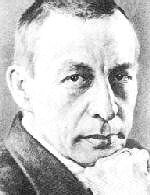Sergei Rachmaninoff
![]()
Sergei Vasil'yevich Rachmaninoff had a rough chilhood. His father
was a drunk and gambler, wasting his wife's estate and then abandoning the
family. With this foundation of instability and being unasved,
 Rachmoninoff
had a hard time adjusting to life as a young man. His extrodinary talent
as a pianist is what brought him fame that no doubt would not have existed
otherwise.
Rachmoninoff
had a hard time adjusting to life as a young man. His extrodinary talent
as a pianist is what brought him fame that no doubt would not have existed
otherwise.
After various failures and successes in his training years, Sergei Rachmaninoff wrote his First Symphony in 1895. It was met with severe criticism which brought on "the composer's worst crisis of psychic distress and lethargy..." (1). He thus entered a time when he could neither write nor play music. He was then persuaded to visit a certain Dr. Nikolai Dahl, specialized in hypnosis. In 1900, from January to April, Rachmaninoff daily "visited the doctor's somberly velvet-draped chambers. From the quiet, Dahl would repeat over and over: 'You will begin to write...you will work with great facility...the music you write will be good music.' "(1) What this produced was Rachmaninoff's famous Second Piano Concerto. Rachmaninoff said later, "Although it sounds incredible, this cure really helped me. I began to write..new musical ideas began to stir within me - far more than I needed for my concerto."(1)
As if this wasn't bad enough, he also composed a symphonic poem entitled The Isle of the Dead, as well as a piece for orchestra and chorus entitled The Bells, which was based on a poem by, the infamous Edgar Allen Poe.
Rachmaninoff's First Piano Sonata (1907) was based on Goethe's Faust. Here again we see his fascination with devilish type things. In keeping with his bizarre tastes, the last and most powerful movement of the piece corresponds with Satan, Mephistopheles from Faust.
No doubt Mr. Rachmaninoff was inspired by his witchdoctor's methods. After all, Satan was the "anointed cherub" that had pipes and tabrets (Ezekiel 28:14, Ezekiel 28:13). He can and does "inspire" his servants to produce music. Not only is there the devil's music of today in pop and rock, but there was music of the devil in years past too. "Classical" does not automatically mean "good." Some of the composers were being used of the devil, and Rachmaninoff seems to be one of them.
Rachmaninoff's choices for a title and his inclination toward the works of Edgar Allen Poe also show his taste for the devilish.
Deuteronomy 18:10 There shall not be found among you any one that maketh his son or his daughter to pass through the fire, or that useth divination, or an observer of times, or an enchanter, or a witch.
2 Corinthians 6:14 ... what fellowship hath righteousness with unrighteousness? and what communion hath light with darkness? 15 And what concord hath Christ with Belial? or what part hath he that believeth with an infidel? 16 And what agreement hath the temple of God with idols? for ye are the temple of the living God; as God hath said, I will dwell in them, and walk in them; and I will be their God, and they shall be my people.
We recommend that you substitute the works of such Reformation-minded composers as Johann S. Bach and George Fredrick Handel for the works as such men as Sergei Rachmaninoff.
--Mary Van Nattan
(1) Information taken from a cassette tape jacket by RCA Victor RED SEAL.
![]()
![]()
spchk mt/--

